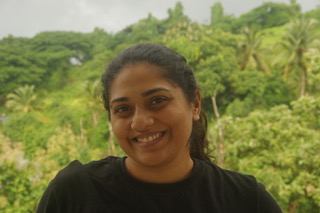We pull the strings of the catastrophe, so we can also save ourselves simply by changing our lives.
Reduce waste at your own pace! She believes that through education, we can initiate great changes in the way we make, dispose of, and think about waste. This way we can pass on a clean and sustainable planet to future generations. Meet Saritha Sudhakaran – an urban designer – architect currently residing in Goa. She is the founder of Incollab – a design, planning and research collective developing sustainable communities in collaboration with the people who inhabit them. Since Jan 2019, she has been curating the Waste Less Project.
Between its resident population, half-yearly tourist population and floating migrant population, Goa’s per capita waste generation is comparable to many larger Indian cities. Adding to this is the challenge of organising 189 village panchayats, 13 municipal councils and 1 municipal corporation towards a unified waste management vision for the state.
Saritha uses the Project as a tool to research Goa’s waste issues and uses the data to build tools that can help citizens transition from waste generators to less waste generators. As a start, she has built a Waste Management Atlas for Goa with inputs from the community at large.
Furthermore, during weekends, she dedicates her time giving many talks and conducting workshops on many aspects of waste reduction to show people how it is possible to live without a dustbin.
Tell us about the Waste Less Project?
Between its resident population, half-yearly tourist population and floating migrant population, Goa’s per capita waste generation is comparable to many larger Indian cities. Adding to this is the challenge of organising 189 village panchayats, 13 municipal councils and 1 municipal corporation towards a unified waste management vision for the state.
To combat this growing problem, at the start of 2019, I conceived of an alternate solution – the Waste Less Project. This 12-week Project intends to promote waste reduction through collective knowledge sharing and showcases local, adaptable alternatives to current consumption patterns, thereby encouraging people to reconsider what truly is ‘waste’. The first edition of the Project commenced on 7 January 2019 and ran for 12 weeks up to 31 March. 70 participants from across Goa, India and the world registered, of which 22 participants successfully completed the project. The second edition of the project started on 10 June with 22 participants and included weekly interactions, sample products to help people start adapting the guidelines and also talks by experts on ideas to scale up the guidelines for the community at large.
How does it work?
Every Monday, participants are provided with a set of guidelines to tackle some items of household waste. These range from alternatives to personal care products used by an individual to replacing chemical based cleaners in a household. Through the course of the week, participants are provided the short guideline, detailed explanation of the need to switch from unsustainable options, sources for buying the alternative locally and additional resources via WhatsApp, Facebook, Instagram, Email or Blog. They are also encouraged to share any queries, challenges, successes and failures in attempting the guidelines with other participants via any of the above media. At the end of the week, feedback forms are shared for me to gauge participant’s ease of adopting the week’s guidelines. The lifestyle changes are easy to begin with but become incrementally challenging in the subsequent weeks.
Registration per session is limited to 20-25 people since I dedicate a lot of personal time to each participant and am accessible to answer any questions throughout the day. Registration for the third edition commenced in August 2019.
So far, the issue of waste has generally been addressed through the mopping approach (collection and disposal of waste). WasteLess, on the other hand, believes in ‘closing the tap’ through collaborative efforts. Join the bandwagon at
Facebook – https://www.facebook.com/wastelesscollective/
Instagram – wastelesspro


